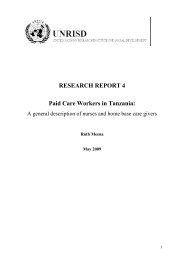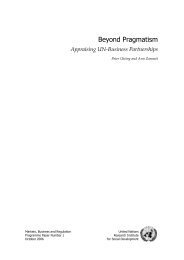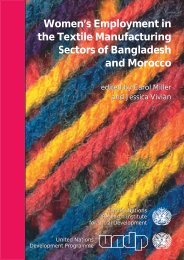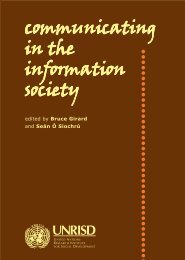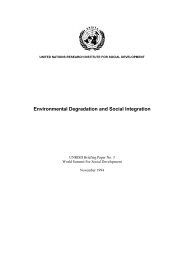The Politics of Gender and Reconstruction in Afghanistan
The Politics of Gender and Reconstruction in Afghanistan
The Politics of Gender and Reconstruction in Afghanistan
Create successful ePaper yourself
Turn your PDF publications into a flip-book with our unique Google optimized e-Paper software.
EVOLVING INSTITUTIONAL FRAMEWORKS AND WOMEN’S RIGHTS: POTENTIALS AND LIMITATIONS<br />
IV.E.<br />
prospects for women’s civic<br />
<strong>and</strong> political participation:<br />
citizenship postponed?<br />
Women’s community participation <strong>and</strong> leadership roles<br />
frequently go undetected <strong>in</strong> <strong>Afghanistan</strong> s<strong>in</strong>ce they do<br />
not take place <strong>in</strong> the public arenas commonly associated<br />
with modern civil society. As Barakat <strong>and</strong> Wardell<br />
po<strong>in</strong>t out:<br />
<strong>The</strong>re is a tendency for outsiders unfamiliar with the nuances <strong>and</strong> complexities <strong>of</strong> Afghan culture to focus<br />
only on the visible, public arena <strong>and</strong> to neglect those private areas such as the household. It is <strong>in</strong> precisely<br />
these areas that Afghan women themselves claim to exercise the most political <strong>in</strong>fluence.<br />
(Barakat <strong>and</strong> Wardell 2002:919)<br />
Indeed, the politics <strong>of</strong> alliances <strong>and</strong> reputation plays a central role <strong>in</strong> tribal <strong>and</strong> village societies, <strong>and</strong> women<br />
participate <strong>in</strong> decision-mak<strong>in</strong>g through important roles <strong>in</strong> matchmak<strong>in</strong>g, gift exchange <strong>and</strong> participation <strong>in</strong> lifecycle<br />
rituals. Advanc<strong>in</strong>g age, religious learn<strong>in</strong>g <strong>and</strong> membership <strong>in</strong> powerful l<strong>in</strong>eages may confer considerable<br />
authority on women.<br />
Nonetheless, women are excluded from formal bodies <strong>of</strong> local governance, dispute settlement <strong>and</strong> arbitration<br />
such as tribal jirgas or village shuras, which tend to be all-male assemblies. Women’s grievances are generally<br />
addressed through male representatives, <strong>and</strong> the loss <strong>of</strong> male protectors <strong>and</strong> mediators (fathers, husb<strong>and</strong>s or<br />
brothers) may leave them without recourse. Women’s citizenship status rema<strong>in</strong>s l<strong>in</strong>ked to their male relatives.<br />
In a sample <strong>of</strong> refugee <strong>and</strong> returnee women, it was found that pro<strong>of</strong> <strong>of</strong> citizenship could only be obta<strong>in</strong>ed through<br />
a male relative, as most women were unclear about whether they possessed any <strong>of</strong>ficial documents to identify<br />
themselves as <strong>in</strong>dividuals with citizenship rights (UNHCR 2002). Despite the removal <strong>of</strong> regulations barr<strong>in</strong>g<br />
women from study<strong>in</strong>g, work<strong>in</strong>g, or go<strong>in</strong>g out without wear<strong>in</strong>g a burqah or without a mahram, few women <strong>in</strong> south<br />
<strong>and</strong> southeast <strong>Afghanistan</strong> reported they were avail<strong>in</strong>g themselves <strong>of</strong> the opportunities that this relaxation <strong>of</strong> the<br />
law seemed to <strong>of</strong>fer (Human Rights Watch 2003). <strong>The</strong> significant discrepancies between women’s formal <strong>and</strong><br />
substantive rights signal deep-rooted obstacles to women’s political participation.<br />
Educated urban women, particularly returnees from abroad, have a heightened awareness <strong>of</strong> the importance <strong>of</strong><br />
their substantive participation <strong>in</strong> political processes, but there is a wide chasm between these women <strong>and</strong> their<br />
illiterate rural counterparts. A report based on a survey conducted by the Human Rights Research <strong>and</strong> Advocacy<br />
Consortium found that both women <strong>and</strong> men agreed that only educated women should participate <strong>in</strong> political<br />
decision-mak<strong>in</strong>g, while no such strictures were placed on men’s participation (2003:27). Likewise, <strong>in</strong>tentions<br />
to vote <strong>in</strong> the national election were much lower among women than among men, especially <strong>in</strong> certa<strong>in</strong><br />
prov<strong>in</strong>ces (<strong>in</strong> Gardez only 27 per cent <strong>of</strong> women said they would vote <strong>in</strong> an election, compared with 65 per<br />
cent <strong>of</strong> men), <strong>and</strong> women surveyed were 20 per cent less likely than men to know about important national<br />
political developments (such as the constitution <strong>and</strong> the national elections).<br />
PAGE 27




